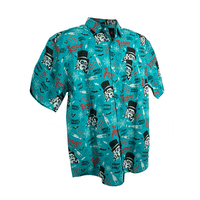The Waltons creator wrote this episode to combat the rise of reality TV
Earl Hamner, Jr. felt “sickened” by reality TV seen in the Eighties.

When John-Boy lands a job hosting a TV show in The Waltons episode "The Threshold," Jim-Bob immediately sets out to build the family a television set so they can tune in.
This episode was a particularly special episode to The Waltons creator Earl Hamner, Jr. who co-wrote it with his son Scott and considered it a standout of the show’s ninth season.
"In it, the Walton family sees television for the first time," Hamner told The Morning News in 1981. "The episode addresses itself to the potential the medium offers each of us, to its power to move and influence people, to its enormous potential for good, to its awesome ability to communicate, to its value as a medium in which we can celebrate the best of humankind."
TV viewers today streaming reality shows may not exactly see television as the noble medium that Hamner describes, and it might surprise you to know that this episode was specifically written because Hamner wanted to dissuade audiences from making reality TV the future of TV.
Hamner felt "sickened" by early iterations of reality TV in the Eighties.
"Not too long ago, I was flipping the dial and I saw a … man douse himself with chicken fat, then set himself on fire, and dash to a swimming pool in a contest between immolation and salvation," Hamner said. "Thank God, he got there in time, and probably suffered only superficial burns."
Watching this kind of programming share the same air that The Waltons breathed bothered Hamner to the point where he said he wanted to quit writing for TV entirely.
"The event sickened me and forced me to ask myself: how could I remain in a medium where such degradation of the human spirit is possible?" Hamner asked himself. "If television is headed toward such gladiator sports, how can I, with good conscience, dedicate my talent and my energy to it?"
Fortunately for fans of The Waltons who would’ve hated to see Hamner give up writing for TV, Hamner ultimately came to a different conclusion, which was rooted in the same notions of empathy that made watching The Waltons so enjoyable.
"The answer came back that we’re all human, and if there is a baseness in us that will allow ourselves to take pleasure in seeing a man set fire to himself, there is also a part of us that is noble, reaching for the human qualities of compassion, pity, sacrifice, love, decency," Hamner said.
He vowed to keep The Waltons as a sanctuary on the dial, a spot where viewers could depend on him to never appeal to such baseness, but instead to their better judgments.
"Because we have celebrated those values in The Waltons, and because I feel we need to support those values for our audience in a threatening and confusing world, the series is still growing, changing, living," Hamner said. "And while we will never set a person on fire, we may occasionally light a candle to help us see ourselves better."








34 Comments

"Reality TV" as it's defined today--put a bunch of strangers into a situation, and with some prodding of producers, chaos ensues--didn't get started until the 1990s. But "covering yourself in chicken fat, lighting it on fire and running to a pool" isn't a Big House kind of thing. This is more of a game show challenge on steroids. And we've had decades Truth(bzz)or Consequences, Beat the Clock, and other games shows where you embarrass yourself for money, all of it safe and harmless. I just don't think that this event took place on U.S. TV. The threat of fines from the FCC and the possibility of being sued by the injured contestant would keep producers from letting this happen in the U.S. in the 70s or 80s.
Maybe he saw in on Japan TV.
I'm not even sure what programming upset him, whatever it was, I wasn't watching it. It woukd be nice to dig deeper and find specifics.
But Earl definitely saw the writing on the wall. Along with Newton Minow, who called television America's "Vast wasteland."
Boy if those guys could see television today....
Butthey'd had radio allalong, how would John Boy getting a radio show mean much? Jason had that love advice.show. Ithink the episode was to show the hope of the future, getting back to normal. The university is given the equipment, they have to show it off. No, few people could had tv sets to receive it, but that's no different from when they broadcast from the 1939 NY World's fair. They had sets at the Fair, and I assume in public setting away from the fair. I'm sure the university had some sets on campus. And Jim Bob got his tv set working, so family and friends coukd come to a watch party.
Someone had started to build a tv set, Jim Bob bought the remains. And he was more capable. I thought he said someone had bought a kit, not likely that early. But a handful did build their own tv sets in the thirties, I've seen the magazine articles
New York, Chicago or Los Angeles. The episode wasn't "extrapolating" engineering experience or the availability of parts in the storyline. So under those conditions it would have been possible whether on Walton's Mountain or The Twilight Zone...LOL!
But rather than attacking using the argument of content, with a desire to purify the contributions made to television (even threatening to desert the medium). Why not protect it’s basic freedom, while encouraging the judicial selection of worthy programming. [In the end he did, sort of, by continuing his work]. But ratings (that which is memorable for good or bad) is what drives the game. Human nature will never divorce itself from the duality of good and bad. But we can expect decent people to develop their own conscience about what they wish to support. Which is where (IMO) he needed to focus.
My hunch is that he was showing a bit of creative talent elitism. "𝐼 𝒸𝓇𝑒𝒶𝓉𝑒 𝒶𝓃𝒹 𝓉𝒽𝑒𝓇𝑒𝒻𝑜𝓇𝑒 𝐼 𝒿𝓊𝒹𝑔𝑒." But it's not quite that simple.
Also remember the MeTV story where EHJ went to the extreme of showing his appreciation for some thing, I can’t remember. He was definitely unique in his approach to living.
Since I'm nitpicking, unless he got a really good surplus deal, it would have been flat 300 ohm feedline.
I love the way we all get so invested in television!!
Whoo. Sorry for the minor wig-out.
Index: If curious
https://time.com/4315217/newton-minow-vast-wasteland-1961-speech/
Newton N. Minow: [quote] "When television is good, nothing — not the theater, not the magazines or newspapers — nothing is better. But when television is bad, nothing is worse."
The original intention was noble enough: Newton N. Minow, FCC Chairman, an official address.
https://www.americanrhetoric.com/speeches/newtonminow.htm
The problem was/is (not in the viewer himself) but that television is a product and a commodity. There is no purpose in it (in terms of investment) unless it generates revenue. Funny though, we do not criticize other products in our marketplace if they do not live up to our expectation. We ignore them. And choose not to purchase. Yet television has (almost) always had a remote control option. And still we feel as if we own the medium, or it owes us something in return. And maybe now, it's less uncomfortable for many viewers, because of dozens of simultaneous options. A person may assume that “Public Broadcasting” was the last, best hope. And thankful for the thoughtful programming it does supply. But the choice of those programs, is still driven by PBS Pledges, and value judgements made by someone else, somewhere along the line. In order to reach the airwaves!
In the beginning, at least in the Sixties, TV Guide (was an ordinary little magazine listing) whose contributors attempted to critique all new offerings scheduled every single September. Nobody has to be reminded of how many of those entries were seriously panned, and yet have become our classic TV staples.
What was missing? Television isn’t and has never been “theater-worthy” where an individual's choice is purchased directly by the theater-goer (consumer). But that was exactly that person’s vote! And Broadway lives or dies on those choices. It is a very direct and consequential connection.
Television is a complicated exchange, however. Ultimately a select few “Network Executives” try to guess (and fail 70% of the time) what will be the viewer’s choice of entertainment. The viewers weren’t watching TV to be (necessarily) enlightened or elevated. They were clearly watching to escape everyday issues, pure and simple. And whichever Show did it in the best way possible, were the ones that survived. It was a very simple equation. And we can thank them today, for their vote! Because, it’s free to us.
Do we question the method of valuation, then? Would we get better selections if people paid for individual selections? Or, are we grateful there's an electronic-land of endless choices for everyone. With minimum effort to consume.






























.jpg)





